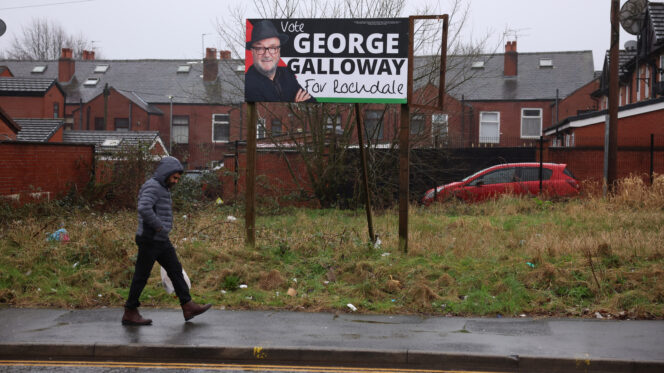Britain’s Future Depends on Its Smaller Cities
Urbanism is central to our national DNA.
by Aaron Bastani
4 March 2024

Conservative visions of Britain are invariably pastoral – the rolling shires of its hinterland held in contrast to the juggernaut of London. On one side, the tier one global city: an outsized metropolis sharing more in common with New York or Paris than any domestic province. On the other, the ‘real’ nation: a land of warm beer and long shadows on county cricket grounds.
There’s only one problem with this story, however. It’s not true. Rather than being a place defined by sleepy villages and country pubs, Britain beyond London has been at the forefront of industrial modernity – from Sir Richard Arkwright’s mills, to Manchester, the birthplace of economic liberalism. It’s easy to forget that these islands were, after all, the first place on earth where humans primarily lived in urban, rather than rural, settings.
Indeed Britain is often viewed in opposition to urban modernity precisely because it led that process – an idealised countryside the foil for a reality built on iron and steel. Peter Hitchens recently tweeted that London’s skyline is a pastiche of Manhattan. A coherent argument you might think, until you remember that Manhattan is itself a pastiche of the Crystal Palace. Built in 1851, that structure was the grandfather of today’s skyscrapers. The harkening to a medieval past of ‘Merrie England’ – identifiable in figures like William Morris and John Ruskin – was a response to the birth of modernity.
This is not merely of historical interest. Today Britain is one of the most urbanised countries on earth – and its population growth still overwhelmingly comes from cities. Indeed, rates of urbanisation since the start of the century are more typical of a developing country. The percentage of Brits in urban areas has increased by 5% over the last two decades – in India that figure is 7% and in Pakistan it is 4%. In other words, the urban experience is not only the country’s past, but its future. The idea that its ‘real’ character can only be detected elsewhere has never been more absurd, or potentially self-destructive.
When thinking about successful cities in the UK, most decision-makers turn to London. With the exception of housing, Britain’s capital is – by many measures – an extraordinarily successful place. Its GDP per capita is twice that of the rest of the UK and, according to the OECD, Greater London is the leading region on health, education and access to services.
Yet the percentage of people living in the capital as a total of the country’s population isn’t as high as you might think. Today it stands at less than 14%, far below the 20% of a century ago.
While the capital grew by 7.7% between 2011 and 2021, slightly outpacing England as a whole, it was outdone by places few regard as political hotbeds. Cambridge saw 17.6% growth over the same period, Peterborough 17.5%, while Milton Keynes clocked 15.3%. Other high-growth locales include Luton, Leicester and Northampton. The prosperity of Britain this century is a function of whether these places succeed or not.
And yet, during that same decade, consecutive Conservative administrations cut local government spending by as much as 50%. Rather than getting high-speed rail to connect places like Sheffield, Manchester, Leeds and Hull, it eventually elected to build a single line between London and Birmingham (which won’t, at present, even extend to Euston station). Then there’s the fact that despite significant population growth in cities and large towns, the country has failed to build enough housing – meaning rents have rocketed while home ownership is much lower than two decades ago. As a result, the country’s de facto housing strategy has become house in multiple occupation (HMO) conversions – with five or six tenants often squeezed into two-up-two-down properties. Not only is this bad for the tenants themselves, but it also puts pressure on local services and undermines that thing politicians everywhere claim to care about: community.
Meanwhile, the high street in most of these places has been decimated by not only online retail but regional and income inequality. The public realm looks ramshackle, but it’s equally true that high energy and rent costs – and a lack of consumer spending power – means small businesses struggle. Rather than think deeply about that, our media and political class prefer to point at the internet and claim they are powerless. It’s far less work for them that way.
Any visit to second and third-tier cities across Europe highlights the scale of the problem. Sheffield might never be Hamburg, but there’s no reason it couldn’t enjoy a similar public realm and level of infrastructure to Katowice. After all, both places are of a similar size and sit within comparably populated metro areas. Over the last decade, two major UN conferences have been held in the Polish city. Is that remotely imaginable in South Yorkshire? Why not?
For all the talk of the north-south divide, zoom in and it is the country’s medium and smaller cities which are least represented of all. They tend to be younger, more diverse and represent the lowest hanging fruit regarding the economy, whether that be improving productivity or eliminating in-work poverty. The Conservatives don’t seem to care because they are increasingly absent from these places. Meanwhile, Labour often takes them for granted. And the Lib Dems? They stand for the least of all.
So how can these places thrive? Meaningful devolution, including powers over tax, for one thing. The primary problem for Britain’s medium and smaller cities is they have neither the means, nor incentives, to build what they want. Rather than generating their own funds, cities older than most countries (think Colchester, Portsmouth or Nottingham) are forced to fight for ‘pots of cash’ occasionally dispensed by Whitehall. The government of the day frames this as an act of charity – as if these places weren’t themselves home to the nation’s taxpayers. It’s a toxic setup which only leads to dysfunction.
But before all that, Britain needs to accept urbanism as central to its national DNA. It has built great cities before, which housed millions and were the cradle of whole industries. There’s no reason it can’t do so again.
Aaron Bastani is a Novara Media contributing editor and co-founder.


